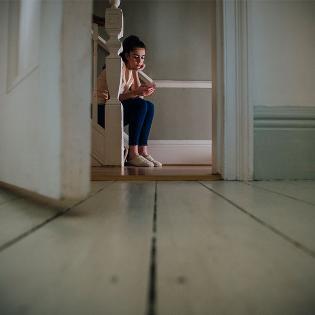BLOG: Lonely in a networked society?
Dr Bianca Fox, Head of Film, Media and Broadcasting and Course Leader for Multimedia Journalism, is researching the connection between social media and loneliness. She talks about her early findings.

We're more connected now than ever before. Social media has enabled us to share information and anecdotes, communicate with like-minded people and develop a sense of belonging, among many positive benefits.
However, for some, the constant use of social media can have a negative impact and they are unable to switch off from their online world.
Observing my students between classes, I was surprised by their lack of interaction with each other; their main interactions were with their smart devices. In fact, some students find it difficult not to check their phones every few minutes.
With loneliness is prevalent among young people I was interested to learn more about how they felt and decided to undertake a research project to gain more insight. It is argued (Victor and Yang 2012) that the extent of loneliness is U-shaped when mapped graphically against age, indicating that younger and older people have the highest risk of experiencing loneliness. Even so, to date, not much is known about loneliness in young adults. Research in loneliness constantly ignores this demographic and fails to address loneliness that affects young people.
Our project, Lonely in a Networked Society, is a ground- breaking attempt to fill in a gap in scholarship. In recent years, loneliness has been associated with internet addiction and mobile phone use. We aim to examine the causes and stories of loneliness among young people (18-24) and identify if loneliness is triggered by the excessive use of social media or smartphones. We hope to find innovative solutions to help us identify people at risk sooner and offer targeted support.

Despite its promise to put an end to isolation, the era of mobile and multi-digital devices has definitely brought with it a deeper sense of loneliness among young people. For some, the only daily social interaction is with their online friends. It is true that some feel less lonely because they can always turn to their online friends when they need someone to talk to. But how meaningful is that online interaction?
Our study is looking at people of all ages that are affected by loneliness and so far research shows that loneliness is a silent enemy for people of all ages. Of our 500 respondents to date, early data shows loneliness among the young is rising.
So far, 70 per cent of young people do not trust their online friends, 86 per cent feel that they lack companionship and 72 per cent report that they feel they are no longer close to anyone even if they have between 200-500 online friends.
Even if we as researchers acknowledge the advantages of social media and online communication, we believe that young people should be taught how to use social media more efficiently and find a balance between online and face-to-face interaction.
This is an on-going project and we invite you to complete our survey and give your views.
For more information please contact the Corporate Communications Team.


/prod01/wlvacuk/media/departments/digital-content-and-communications/images-2024/Diane-Spencer-(Teaser-image).jpg)
/prod01/wlvacuk/media/departments/digital-content-and-communications/images-18-19/220325-Engineers_teach_thumbail.jpg)
/prod01/wlvacuk/media/departments/digital-content-and-communications/images-2024/240509-Menopause-Research-Resized.jpg)
/prod01/wlvacuk/media/departments/digital-content-and-communications/images/Maria-Serria-(teaser-image).jpg)
/prod01/wlvacuk/media/departments/digital-content-and-communications/images-2024/241014-Cyber4ME-Project-Resized.jpg)
/prod01/wlvacuk/media/departments/digital-content-and-communications/images-2024/240315-Research-Resized.jpg)
/prod01/wlvacuk/media/departments/digital-content-and-communications/images-2024/BDA-group-photo.jpg)